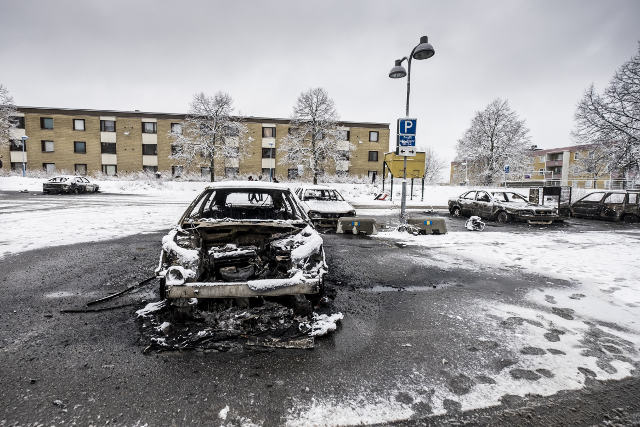The answer is no.
Whether you call them No-Go Zones or the PC nuanced “particularly vulnerable areas”, no sane person living in the area would be willing to risk life and limb to testify against the jackals reeking havoc on that society. The facts are simply this. Successive Swedish governments over the decades have allowed people from all over the 3rd world (who bring their problems and their biases with them) into the country.
There is no willingness in the political ruling class to place a moratorium on immigration in order for assimilation to catch up, and many of the new immigrants hailing from Muslim countries have no willingness to assimilate themselves thereby compounding the problem.
The religiously held belief that more immigrants are needed on a regular basis in order to help, sustain and maintain, the highly vaunted Swedish welfare system is deemed an unassailable position. Anyone who offers a dissenting view of that position is considered a crank, a kook, a misfit, no matter how well the talking points are crafted.
The same mind-think can be found in the US as well, and it doesn’t bode well for the social fabric of society, with multiple ends be tugged in this and that direction and a huge knife it ripping from the middle.
Opinion: Would you dare to testify if you lived in Rinkeby or Rosengård?
If criminals in certain areas know that they will get away with it because no one who lives there dares testify against them, that means that they have great power. Regardless of whether it is possible to walk around there without problems.
In a Swedish police report from 2015, these places are called “particularly vulnerable areas”. No-go zones has become a more common but controversial label. Would you even dare travel there? That question is now one that has been given international attention.
When the American freelance journalist Tim Pool spent the night in Rosengård, he was not attacked. Aftonbladet triumphantly presented his account. Ha, what are you saying now? Of course you can travel to these no-go zones!
When he later visited Rinkeby, on the other hand, things became threatening and Pool quickly changed his view. But that whole thing is a side note, regardless of what he has been part of.
Because neither the term the police use, nor “no-go zones” capture what is special about these areas. The police are not arguing that it would be dangerous for common people to travel there and look around for a bit, nor that the area is more vulnerable than other socially troubled areas.
There are two different factors: in part because the police can’t work there in a normal way without special routines or equipment, and in part because the public there are reluctant to turn to the police and the legal system because of systematic threats from the criminals. There has been a shift in power in the area: common societal influence is weakened and in retreat. You can call these places retreat areas.

